
Brighter Shores: Preview
While this preview will often make comparisons between Brighter Shores and RuneScape, I think it’s important to center this thought: Brighter Shores is not RuneScape, nor is it a RuneScape replacement. There are myriad reasons why this is the case, and I’ll explain a few of them down below, but up-front, it’s unfair to compare a game in Early Access to something that has had years of development time and live-service under its belt.
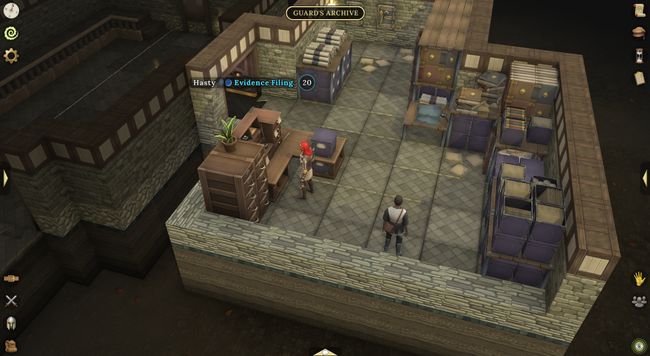
But even if you wanted to compare it to an older version of RuneScape, think about this: if I asked you to recall your favorite moment from RuneScape, assuming you played it at some point in your life, odds are good you would recall a time from around 2006 to 2009, give or take a few years. Considered the hey-day of the decades-old MMO, it was popular enough to get a spin-off of the main game (commonly known as Old-School RuneScape). Even then, 2007-ish RuneScape had several years of time as a live-service game already clocked in.
Brighter Shores, on the other hand, has recently been released for the public in Early Access. So if you’re coming from RuneScape and expecting this game to immediately supplant the other, you are in for some heavy disappointment. But, if you’re willing to open your mind a little and accept that Brighter Shores isn’t chasing RuneScape, but instead is heading in its own direction, you might find that you enjoy the change of pace. However, there are some things from RuneScape that could have made the jump, if the developers wished.
Let’s take it from the top: Brighter Shores is a new point-and-click MMO from the creative mind of Andrew Gower and his team at FenResearch. Gower was one of the original creators of RuneScape decades ago, so you can understand why there’s some weight behind this project. Brighter Shores was originally revealed years ago as having been in development since 2012, and the pitch is pretty simple: people wanted Gower to make a new MMO and he obliged.
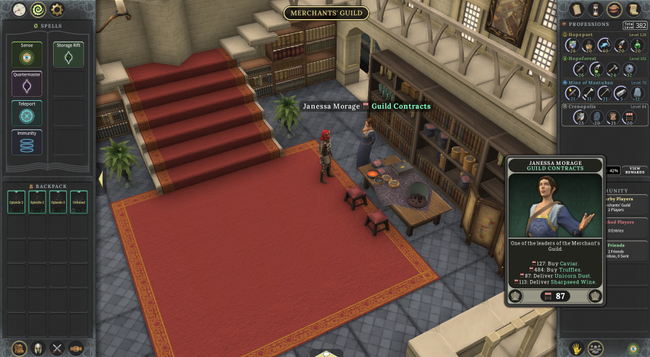
When you enter Brighter Shores, the comparisons to RuneScape are immediate — your character moves along a grid with a camera in the sky, there are things to click on to investigate, collect, and fight, and you have a handful of skills that are trained individually from each other but bleed into one another. That is honestly about the extent of the similarities, however.
Whereas RuneScape drops you in the world (post tutorial island, of course) and lets you go adventuring, Brighter Shores has a pretty strict set of guardrails for you to follow. You have to learn the basics of combat, potion-making, foraging and the like to be a good Guard, but you can’t just up and waltz into Crenopolis (the final zone of the game as of this writing.) In a way, this is a good thing — a common complaint from new players of RuneScape is that overwhelming feeling of choice paralysis.
While choices do exist in Brighter Shores, there are some guidelines you have to follow if you want to proceed. Going from Chapter 1 to Chapter 2, for example, requires level 20 Guard and level 60 Hopeport Total Level. With the way experience scales, there is no feasible way your average player will grind Guard to level 60, so they must dabble in the other four skills available to them. (Experience required to level up increases dramatically at level 20.)

Furthermore, to complete Chapter 4, the player requires Crenopolis Level 60 and Total Level 342 — again, something that is not feasible to put into a single skill. This eliminates the notion of “pures”, as you can’t just be extremely proficient at a single skill if you wish to experience the entire game. This is a marked change in game design philosophy, but not an unwelcome one. You slowly unlock new skills as you progress along the main story, and will eventually unlock them all. Hopefully, by this point, you’ve solidified an idea of what you’d like to focus on.
The feeling of playing an MMO board game is not lost on me — traversing a grid-based environment, unlocking new rooms to explore, having set locations to deposit materials and loot, all of it makes you genuinely feel like you’ve cracked open your copy of Descent: Legends of the Dark. Although, I would argue that the combat in that game is leagues more involved…
That bears some explanation — combat in RuneScape was never complicated. Even with the Evolution of Combat (for those that don’t play, this was a combat rework to be more like other MMOs with cooldowns and queued abilities), the combat was little more than two game entities smacking each other with swords and watching numbers appear. There was very little skill involved for most non-PvP encounters, minus some challenge bosses that require gear-swapping, tick-based movement or “flickering” prayer benefits.
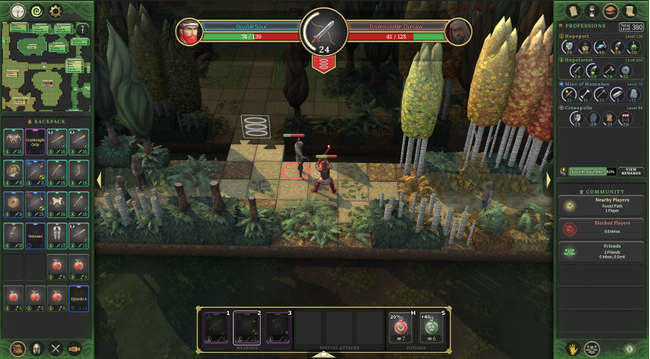
So it makes sense that Brighter Shores is also not complicated, but it still leaves me wanting more. You can equip three weapons (a one-handed weapon and a shield, a two-handed weapon, and a ranged weapon) and you can swap mid-combat as you please, but beyond equipping gear with better numbers, there’s not much meat on that bone. There are supposedly skills, magic and abilities, but in my 60 hours played, I did not discover any combat techniques at all.
Speaking of better numbers, there are four combat-related “skills”, but they all equate to the same thing. Your Guard level allows you to fight stronger foes in Chapter 1, but has no bearing on your ability to fight things in Chapters 2 or beyond. The same is true in reverse — my Watchmen level is higher than the other combat skills, but Chapter 4 gear is only usable in Chapter 4. If I travel back to Chapter 1 to do a quest, I have to re-equip Chapter 1 gear.
Personally, I don’t care much for this system. Part of the joy of finding a cool piece of gear is the ability to take it everywhere with you. If I find a Dragon Scimitar for the first time, you better believe I’m taking that d-scim everywhere I go. In Brighter Shores, I have a Legendary tier Quarterstaff, but I can’t bring it with me outside of Chapter 4, and that feels bad.
The system for gear-swapping is thankfully painless — simply use your Quartermaster magic and hit the “auto-equip” button to select a chapter. The game will automatically equip the best pieces of gear you have and automatically store your old gear, which is handy. You can use this magic anywhere, so the barrier to gear-swapping is very low. I just wish I could carry gear across chapters.
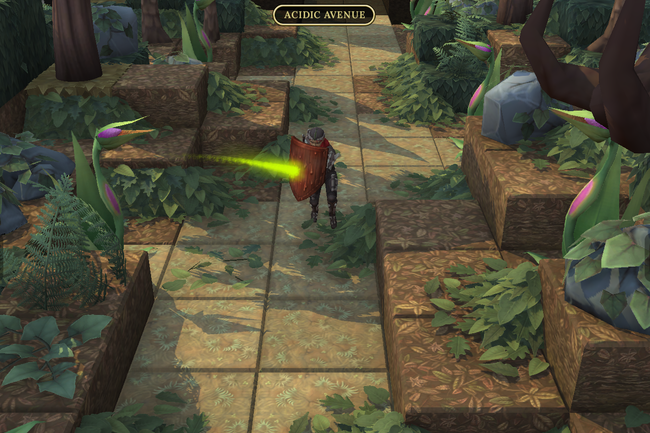
I think the biggest selling point of Brighter Shores, beyond being a very low-intensity MMO with plenty of skills to make numbers go up, is the design of the world, from the visuals to the music. The sound designers have crafted a beautiful dynamic soundtrack, so that the music shifts in cadence as you enter and exit various situations. What was a relatively calm exploration melody may suddenly become an excitable march as you enter combat, or an somewhat uplifting tune becomes a jaunty knee-slapper as you enter a tavern, that sort of thing. It’s fantastic and I would buy the soundtrack immediately if it were available.
The board game aesthetic shapes the environmental visuals as well — Wild growth and trees give way to rotting wood and caves as you leave the forest, or exiting the city via the boardwalk will naturally morph into beaches as an example. There are plenty of interesting objects to look at as you explore the world, but it is a bit of a shame that there are no “right-click” infographics like in RuneScape. They have been transplanted towards these “info cards” you get after collecting or defeating the object in question, but it removes a little bit of interactivity with the world.
I unfortunately don’t have much to say about the story of Brighter Shores. What’s there is pretty alright, but it is extremely barebones at the moment. This is a large part of early access, of course, so it’s not something that I feel is a negative, it just feels very dry. The side quests on the other hand felt like coming home after a long trip. RuneScape-style quest design is very much on display in Brighter Shores, with many quests requiring different skills at different levels and featuring a wide range of puzzles for you to tackle. One such quest in Chapter 3 immediately (and horrifyingly) reminded me of Elemental Workshop, to the point where I set my character to do a passive activity and logged off to get away from it.
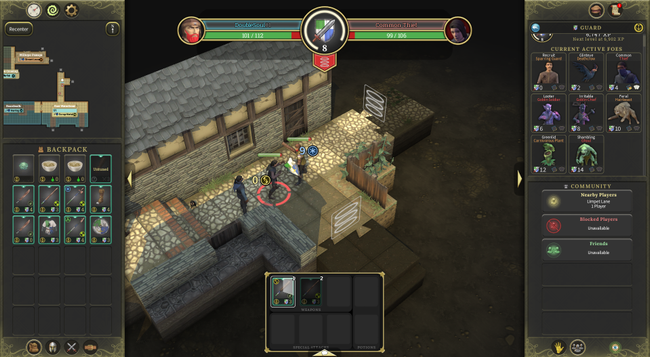
Speaking of passive activities, a neat feature of Brighter Shores is the ability to engage in training a skill passively. Your character will still be training that skill, even offline, assuming they have the appropriate materials or space in their inventory. The per-item experience gain is low, so it’s definitely slower then training normally, but setting it before work or sleep means you are still progressing when you’re not playing the game. However, to unlock this feature for a skill, you must first gain a Knowledge Point from playing the game normally, then spend it to learn the passive activity. This is an awesome feature and I’m very glad it exists, because the days of skipping school to play video games are long, long behind me.
I could go on and on about the interesting ideas I think I see the development team heading in, but I think I’ll end by saying that Brighter Shores is shaping up to be a great MMO. It has a long road ahead of it, but everything I’ve played so far has allowed me to trust Gower and his team, and believe in their vision for the game. It’s rough around the edges, and is missing a few features here and there, but with a roadmap already clearly laid out, it’s easy for me to simply trust the plan.
But in order to trust the plan, you have to be willing to let go of the idea that this is a replacement for RuneScape. Brighter Shores is heading towards a different shore, and looking to shape a corner of the MMO market for itself — and for me at least, I’m excited to join along for the ride. The first two chapters are free-to-play, so you can try it yourself and see if you like it, but definitely go in understanding that you’re experiencing an unrealized, early access version of what’s to come.
Brighter Shores is out now in Early Access on Steam.